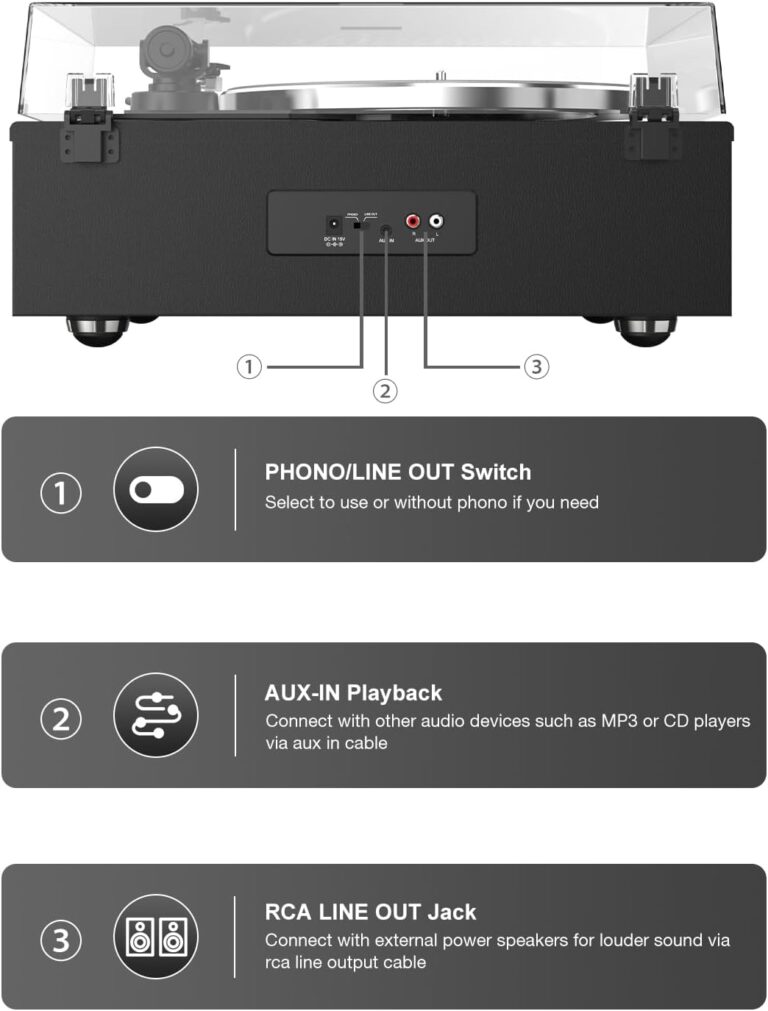The Joy of Casual Listening: Relax, Unwind, and Enjoy the Music
Welcome to the world of casual listening, where easygoing music and laid-back tunes create the perfect backdrop for relaxation and tranquility. Whether you prefer chill vibes, mellow playlists, or background audio that sets the tone for a nonchalant day, the power of carefree tunes is undeniable.
Take a moment to imagine yourself in a blissful state, effortlessly immersed in the soothing melodies and nonchalant rhythms that put your mind at ease. With casual listening, you can escape the stresses of everyday life and embrace the joy of music that brings a sense of calmness and serenity.
Research has shown that casual listening has a transformative effect on our mental wellbeing. It has the ability to evoke emotions, relax the mind, and even change brain functioning, leading to a significant reduction in stress levels. When we find the right music, it can synchronize brainwaves, induce relaxation, and create a soothing environment that counteracts the physiological responses associated with stress and anxiety.
Whether you’re lounging at home, enjoying a walk in nature, or simply seeking solace in your own thoughts, casual listening offers a therapeutic experience that can rejuvenate your soul and nurture your mental health. It provides a space for emotional expression, psychological healing, and personal introspection.
So, welcome to the world of effortless music and the joy of casual listening. Sit back, unwind, and allow the music to wash over you. Embrace the nonchalant melodies and let them transport you to a place of relaxation and serenity. With casual listening, the possibilities are endless, and the benefits for your mental well-being are immense.
The Power of Music in Reducing Stress
Listening to music has been proven to be an effective tool for reducing stress. Music has the power to evoke emotions, relax the mind, and change brain functioning, leading to a significant reduction in stress levels. Calming music, such as soft piano melodies or tranquil nature sounds, can gradually shift your emotional state, steadying your breathing, dissipating muscle tension, and inducing a sense of calm.
Research suggests that music with a slow tempo, around 60 beats per minute, can synchronize brainwaves, leading to alpha brainwave patterns associated with relaxation and consciousness. This synchronization creates an environment conducive to reducing stress levels. Moreover, studies have shown that relaxing music can lower cortisol levels, a biological marker of stress, and have a positive impact on heart rate and blood pressure.
The soothing melodies and comforting rhythms of music create a calm and steady environment, allowing the cardiovascular system to find balance and promote overall well-being.
Music has a profound impact on our well-being, reducing stress and promoting relaxation. By incorporating calming melodies and rhythms into your daily life, you can experience the transformative power of music for yourself.
The Impact of Music on Mental Health
Music has a profound impact on mental health. Numerous studies have shown that listening to music can reduce stress, improve mood, and promote overall well-being.
“The therapeutic benefits of music extend beyond mental health, also reducing pain perception, improving sleep quality, and enhancing overall quality of life.”
Music has the ability to evoke emotions and connect with individuals on a deep level. It has been increasingly utilized as a therapeutic tool in various healthcare settings, including music therapy.
Music therapy is an evidence-based practice that involves using music interventions to address individual needs and improve well-being. It can facilitate emotional expression, decrease anxiety and depression, and promote overall psychological healing.
Music Therapy and Mental Health Conditions
Research has shown that music therapy can be effective for various populations, including children with autism, individuals with dementia, and those struggling with mental health conditions such as depression and anxiety.
Music therapy provides a safe space for exploration, allowing individuals to process difficult emotions or traumatic experiences. It offers a unique approach to mental health treatment, harnessing the power of music to heal and transform.
The Therapeutic Benefits of Music for Mental Well-being
Listening to music can have immediate and long-term effects on mental well-being. It can provide a sense of comfort, boost mood, and enhance emotional resilience.
Music has the ability to transport us to a different emotional state, whether it’s through uplifting melodies that inspire joy or calming tunes that invite relaxation.
Using Music as a Form of Self-Care
Engaging with music can also serve as a form of self-care. Taking the time to listen to our favorite songs or explore new genres allows us to focus on our personal well-being and take a break from the stresses of daily life.
Whether we’re dancing to the rhythm or quietly reflecting while listening to soothing melodies, music has the power to transport us to a state of calm and rejuvenation.
Finding the Right Music for Relaxation
When it comes to using music for relaxation, different types of music can have varying effects on our minds and bodies.
Classical music, known for its soothing melodies and gentle rhythms, has long been associated with relaxation and stress reduction.
Nature sounds, such as raindrops or ocean waves, have a natural ability to induce feelings of peace and connection.
Instrumental music without lyrics allows the mind to focus on the melodies and harmonies without distraction.
Meditation music, specifically designed for meditation practices, aims to promote deep relaxation and inner peace.
These are just a few examples of the types of music that can be effective in promoting relaxation. The key is to find the genre or style that resonates with you personally and helps create a sense of calm and relaxation.
Why Classical Music?
Classical music has a unique ability to evoke emotions and create a serene atmosphere. It often features slow, graceful melodies and harmonies, providing a sense of tranquility and balance. Listening to classical music can transport you to a peaceful state of mind, helping to reduce stress and promote relaxation.
The Power of Nature Sounds
Nature sounds, such as the gentle patter of rain or the rhythmic crashing of ocean waves, have a calming effect on the mind and body. The rhythmic patterns and gentle repetition of these sounds can induce a sense of peace and connection with the natural world, creating a soothing and relaxing environment.
The Beauty of Instrumental Music
Instrumental music, without the distraction of lyrics, allows the listener to fully immerse themselves in the melodies and harmonies. This type of music promotes deep focus and concentration, creating an atmosphere of calm and relaxation. Instrumental music can be found in various genres, from classical to jazz to ambient, offering a wide range of choices to suit individual preferences.
Meditation Music for Inner Peace
Meditation music is specifically designed to enhance the meditation experience and promote deep relaxation. It often features soothing sounds, repetitive patterns, and gentle rhythms to create a meditative state of mind. This type of music can help calm the mind, reduce stress, and create a peaceful and serene atmosphere for personal relaxation.
Crafting Your Personalized Stress-Relief Playlist
Crafting a personalized stress-relief playlist can be an enjoyable and empowering experience. When life gets overwhelming, music has the power to calm your mind, uplift your spirits, and help you unwind. By curating a collection of songs that resonate with you personally, you can create a soothing soundtrack to accompany your daily life.
Whether you prefer classical music, nature sounds, instrumental melodies, or relaxing meditation tracks, tailoring your stress-relief playlist to your individual needs and preferences can make a significant difference in how you manage stress and promote positive emotions.
To create your stress-relief playlist, start by reflecting on your emotions and considering how different genres or specific songs make you feel. Is there a particular type of music that instantly puts a smile on your face or brings a sense of peace?
Experiment with different genres and explore what resonates with you the most. Focus on songs with a relaxing beat, slow tempo, and soothing melodies that help you unwind and melt away stress.
| Genre | Description | Example Songs |
|---|---|---|
| Classical Music | Known for its timeless beauty and serene compositions, classical music offers a sense of tranquility and emotional depth. | • “Clair de Lune” by Claude Debussy • “Canon in D” by Johann Pachelbel • “Piano Sonata No. 14” by Ludwig van Beethoven |
| Nature Sounds | Immerse yourself in the calming sounds of nature, such as raindrops, ocean waves, or gentle forest ambiance. | • “Rainfall and Thunderstorm” by Nature Sounds • “Ocean Waves” by Relaxing Waves • “Forest Rain” by Nature Sounds |
| Instrumental Music | Instrumental melodies without lyrics allow your mind to focus on the music itself, promoting relaxation and tranquility. | • “Gymnopédie No. 1” by Erik Satie • “Reverie” by Claude Debussy • “The Four Seasons: Winter” by Antonio Vivaldi |
| Meditation Music | Specifically designed to induce a state of deep relaxation, meditation music helps calm the mind and reduce stress. | • “Deep Relaxation Meditation” by Insight Timer • “Inner Harmony” by Meditative Mind • “Zen Garden” by Relaxing Sounds |
Your stress-relief playlist should be a reflection of your personal preferences and what brings you a sense of peace and tranquility. Don’t be afraid to explore different genres and experiment with various artists and songs.
Remember, this playlist is for you and should evoke positive emotions whenever you listen to it. Let it serve as your go-to source for comfort and relaxation, allowing you to unwind and find solace in soothing melodies.

Conclusion
Casual listening to music is a powerful tool for reducing stress and improving mental well-being. The soothing melodies, calming rhythms, and engaging emotions that music provides can have a transformative effect on our minds and bodies.
Research has shown that music can relax the mind, change brain functioning, and significantly reduce stress levels. Whether you choose to simply enjoy the music or engage in music therapy sessions, the therapeutic benefits on mental health are undeniable.
Music has a profound impact on mental health, improving mood and overall well-being. It allows us to express our emotions, process difficult experiences, and find solace in the rhythm and melody. By finding the right music that resonates with you personally, crafting personalized stress-relief playlists, and integrating music into daily routines, you can harness the power of casual listening to relax, unwind, and enjoy the music.
Embracing the joy of casual listening has the potential to elevate your daily life and provide a soothing soundtrack throughout your journey towards balance and tranquility. So, take a moment, put on your favorite tunes, and let the music transport you to a place of peace and serenity. Your mental well-being deserves it.
FAQ
How does casual listening to music help in reducing stress?
Casual listening to music has a soothing effect on the mind and body. It can evoke emotions, relax the mind, and change brain functioning, leading to a significant reduction in stress levels.
What types of music are effective for relaxation?
Different types of music can have varying effects on relaxation. Classical music, nature sounds, instrumental music, and meditation music are often found to be effective in promoting relaxation.
How can I create a personalized stress-relief playlist?
Reflect on your emotions and consider how different genres or specific songs make you feel. Choose songs with a relaxing beat, slow tempo, and soothing melodies. Experiment with different genres to find what resonates with you personally.
What impact does music have on mental health?
Music has a profound impact on mental health. It can reduce stress, improve mood, promote emotional expression, decrease anxiety and depression, and facilitate overall psychological healing.
How can music be integrated into daily routines to reduce stress?
Music can be integrated into daily routines in various ways such as starting the day with music, singing along to music, playing an instrument, utilizing positive affirmations or mantras set to music, incorporating music into exercise, commuting with music, and working with background music.
Our Mission: At AudioInspects, we are dedicated to providing the most comprehensive and authentic reviews of audio equipment on the market. We conduct independent testing and research of products, so you can make an informed decision before making a purchase. Our mission is to help you find the best audio equipment to improve your listening experience. So trust us to deliver the most reliable recommendations and advice.
Disclosure: When you do decide to make a purchase through our links, please note that we may earn a commission, but this does not affect the honesty of our reviews. You can read our affiliate disclosure in our Disclosure.






